专题十二 动词的时态和语态
- 格式:ppt
- 大小:1.67 MB
- 文档页数:59
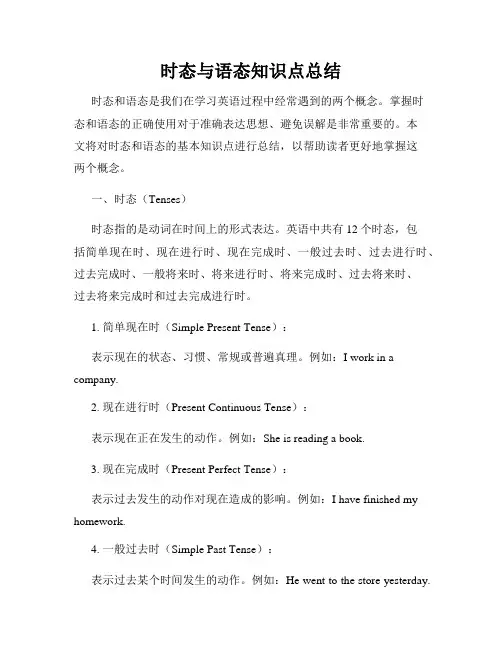
时态与语态知识点总结时态和语态是我们在学习英语过程中经常遇到的两个概念。
掌握时态和语态的正确使用对于准确表达思想、避免误解是非常重要的。
本文将对时态和语态的基本知识点进行总结,以帮助读者更好地掌握这两个概念。
一、时态(Tenses)时态指的是动词在时间上的形式表达。
英语中共有12个时态,包括简单现在时、现在进行时、现在完成时、一般过去时、过去进行时、过去完成时、一般将来时、将来进行时、将来完成时、过去将来时、过去将来完成时和过去完成进行时。
1. 简单现在时(Simple Present Tense):表示现在的状态、习惯、常规或普遍真理。
例如:I work in a company.2. 现在进行时(Present Continuous Tense):表示现在正在发生的动作。
例如:She is reading a book.3. 现在完成时(Present Perfect Tense):表示过去发生的动作对现在造成的影响。
例如:I have finished my homework.4. 一般过去时(Simple Past Tense):表示过去某个时间发生的动作。
例如:He went to the store yesterday.5. 过去进行时(Past Continuous Tense):表示过去某一时刻正在进行的动作。
例如:They were playing basketball when it started raining.6. 过去完成时(Past Perfect Tense):表示过去某个时间之前已经发生的动作。
例如:We had already eaten dinner when she arrived.7. 一般将来时(Simple Future Tense):表示将要发生的动作或存在的状态。
例如:I will call you later.8. 将来进行时(Future Continuous Tense):表示将来某一时刻正在进行的动作。
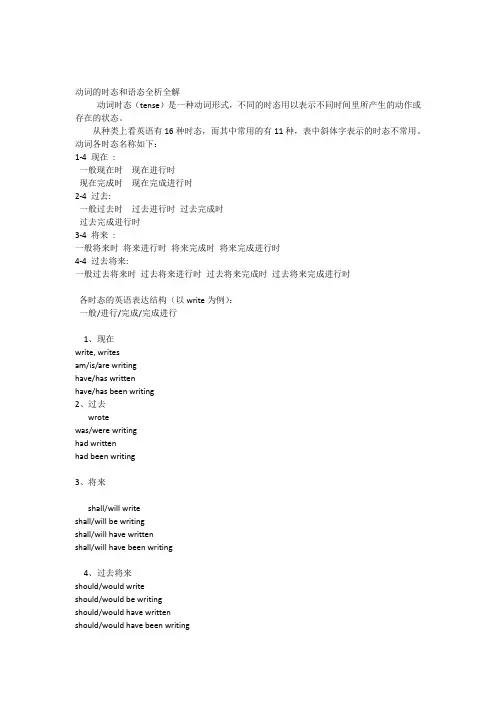
动词的时态和语态全析全解动词时态(tense)是一种动词形式,不同的时态用以表示不同时间里所产生的动作或存在的状态。
从种类上看英语有16种时态,而其中常用的有11种,表中斜体字表示的时态不常用。
动词各时态名称如下:1-4 现在:一般现在时现在进行时现在完成时现在完成进行时2-4 过去:一般过去时过去进行时过去完成时过去完成进行时3-4 将来:一般将来时将来进行时将来完成时将来完成进行时4-4 过去将来:一般过去将来时过去将来进行时过去将来完成时过去将来完成进行时各时态的英语表达结构(以write为例):一般/进行/完成/完成进行1、现在write, writesam/is/are writinghave/has writtenhave/has been writing2、过去wrotewas/were writinghad writtenhad been writing3、将来shall/will writeshall/will be writingshall/will have writtenshall/will have been writing4、过去将来should/would writeshould/would be writingshould/would have writtenshould/would have been writing各时态用法说明一. 一般现在时一般现在时主要由动词原形表示,但第三人称单数作主语时谓语动词后要加-s或-es,另外,be和have有特殊的人称形式。
如:1.一般动词:I know it.You know it.He/She knows it.We/You/They know it.2. 动词be:以am, is, are三种形式出现。
I am a teacher.You are a student.He / She is a student.We/You/They are students.3. 动词have:以have, has形式出现。
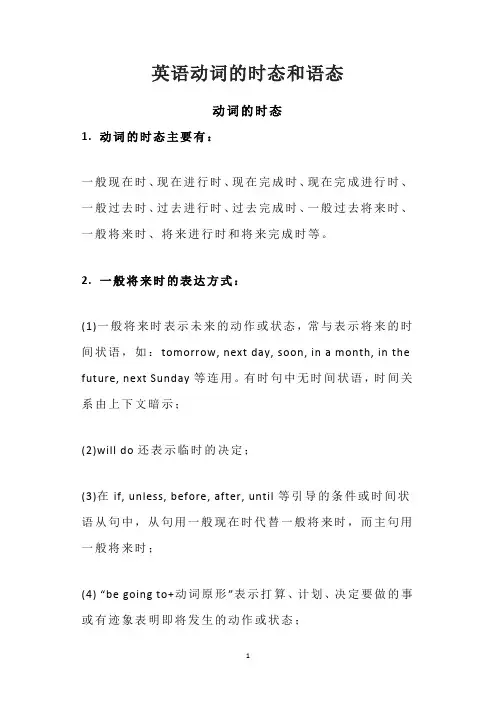
英语动词的时态和语态动词的时态1. 动词的时态主要有:一般现在时、现在进行时、现在完成时、现在完成进行时、一般过去时、过去进行时、过去完成时、一般过去将来时、一般将来时、将来进行时和将来完成时等。
2. 一般将来时的表达方式:(1)一般将来时表示未来的动作或状态,常与表示将来的时间状语,如:tomorrow, next day, soon, in a month, in the future, next Sunday等连用。
有时句中无时间状语,时间关系由上下文暗示;(2)will do还表示临时的决定;(3)在if, unless, before, after, until等引导的条件或时间状语从句中,从句用一般现在时代替一般将来时,而主句用一般将来时;(4) “be going to+动词原形”表示打算、计划、决定要做的事或有迹象表明即将发生的动作或状态;(5) “be+V-ing形式”表示按计划、安排即将发生的动作,这一结构常用于以下动词,如:come, go, leave, arrive, return, fly, meet, see, do, have, get等;(6) “be about to+动词原形”表示打算或安排即将发生的动作。
它一般不与表示时间的副词或其他时间状语连用;(7) “be to+动词原形”表示按计划、安排即将发生的动作;(8) 一般现在时表示按时刻表或根据规定将要发生的动作,这一结构常用于表示位移的动词,如:come, go, leave, start, begin, take off, set off等。
动词的语态1. 一般现在时的被动语态:is/am/are+V-ed。
例如:English is widely spoken all over the world.2. 一般过去时的被动语态:was/were+V-ed。
例如:The underground was built five years ago.3. 一般将来时的被动语态:①will/shall be+V-ed。
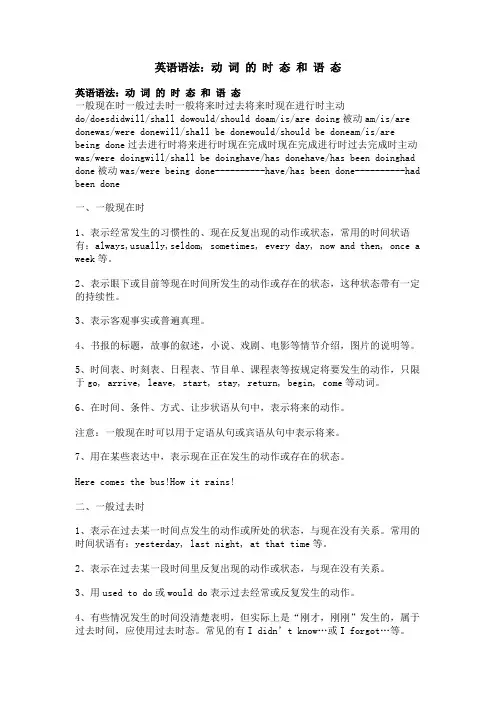
英语语法:动词的时态和语态英语语法:动词的时态和语态一般现在时一般过去时一般将来时过去将来时现在进行时主动do/doesdidwill/shall dowould/should doam/is/are doing被动am/is/are donewas/were donewill/shall be donewould/should be doneam/is/are being done过去进行时将来进行时现在完成时现在完成进行时过去完成时主动was/were doingwill/shall be doinghave/has donehave/has been doinghad done被动was/were being done----------have/has been done----------had been done一、一般现在时1、表示经常发生的习惯性的、现在反复出现的动作或状态,常用的时间状语有:always,usually,seldom, sometimes, every day, now and then, once a week等。
2、表示眼下或目前等现在时间所发生的动作或存在的状态,这种状态带有一定的持续性。
3、表示客观事实或普遍真理。
4、书报的标题,故事的叙述,小说、戏剧、电影等情节介绍,图片的说明等。
5、时间表、时刻表、日程表、节目单、课程表等按规定将要发生的动作,只限于go, arrive, leave, start, stay, return, begin, come等动词。
6、在时间、条件、方式、让步状语从句中,表示将来的动作。
注意:一般现在时可以用于定语从句或宾语从句中表示将来。
7、用在某些表达中,表示现在正在发生的动作或存在的状态。
Here comes the bus!How it rains!二、一般过去时1、表示在过去某一时间点发生的动作或所处的状态,与现在没有关系。
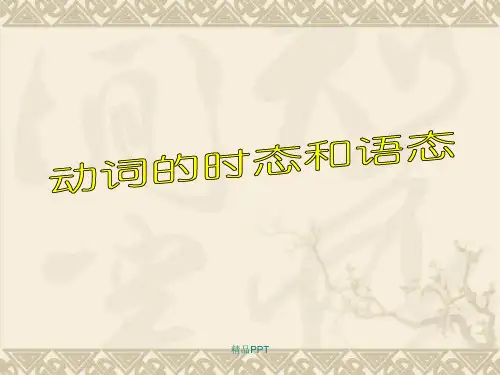
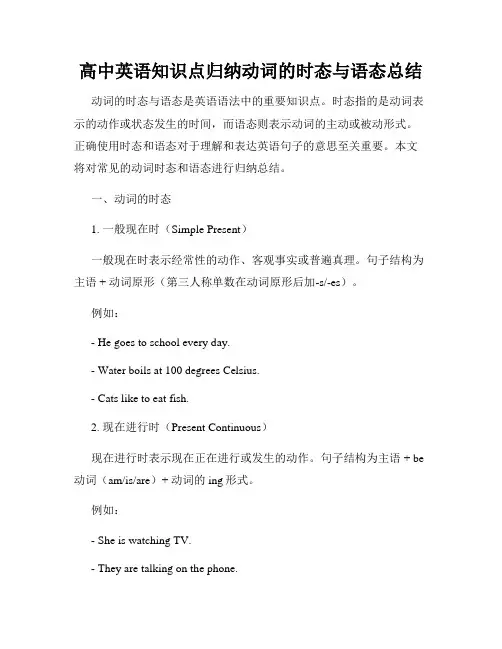
高中英语知识点归纳动词的时态与语态总结动词的时态与语态是英语语法中的重要知识点。
时态指的是动词表示的动作或状态发生的时间,而语态则表示动词的主动或被动形式。
正确使用时态和语态对于理解和表达英语句子的意思至关重要。
本文将对常见的动词时态和语态进行归纳总结。
一、动词的时态1. 一般现在时(Simple Present)一般现在时表示经常性的动作、客观事实或普遍真理。
句子结构为主语 + 动词原形(第三人称单数在动词原形后加-s/-es)。
例如:- He goes to school every day.- Water boils at 100 degrees Celsius.- Cats like to eat fish.2. 现在进行时(Present Continuous)现在进行时表示现在正在进行或发生的动作。
句子结构为主语 + be 动词(am/is/are)+ 动词的ing形式。
例如:- She is watching TV.- They are talking on the phone.- We are studying for the exam.3. 一般过去时(Simple Past)一般过去时表示发生在过去的动作或状态。
句子结构为主语 + 动词过去式。
例如:- I visited my grandparents last weekend.- He studied English in high school.- They went to the concert together.4. 过去进行时(Past Continuous)过去进行时表示过去某个时间点正在进行或发生的动作。
句子结构为主语 + was/were + 动词的ing形式。
例如:- She was cooking dinner when I called her.- They were playing soccer at the park yesterday.- We were watching a movie when the power went out.5. 一般将来时(Simple Future)一般将来时表示将来某个时间要发生的动作。
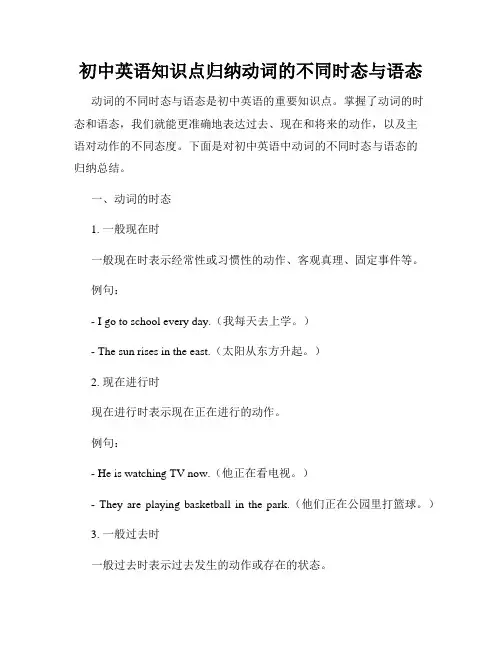
初中英语知识点归纳动词的不同时态与语态动词的不同时态与语态是初中英语的重要知识点。
掌握了动词的时态和语态,我们就能更准确地表达过去、现在和将来的动作,以及主语对动作的不同态度。
下面是对初中英语中动词的不同时态与语态的归纳总结。
一、动词的时态1. 一般现在时一般现在时表示经常性或习惯性的动作、客观真理、固定事件等。
例句:- I go to school every day.(我每天去上学。
)- The sun rises in the east.(太阳从东方升起。
)2. 现在进行时现在进行时表示现在正在进行的动作。
例句:- He is watching TV now.(他正在看电视。
)- They are playing basketball in the park.(他们正在公园里打篮球。
)3. 一般过去时一般过去时表示过去发生的动作或存在的状态。
例句:- We watched a movie last night.(昨晚我们看了一场电影。
)- She lived in Beijing when she was young.(她年轻时住在北京。
)4. 过去进行时过去进行时表示过去某个时间正在进行的动作。
例句:- They were having dinner at 7 o'clock yesterday.(昨天7点他们正在吃晚饭。
)- At this time last year, I was studying in London.(去年这个时间,我正在伦敦学习。
)5. 将来时将来时表示将要发生的动作或存在的状态。
例句:- We will go to the beach next week.(下周我们将去海滩。
)- She is going to visit her grandparents tomorrow.(她明天将要去看望她的祖父母。
)二、动词的语态1. 主动语态主动语态表示主语是动作的执行者。

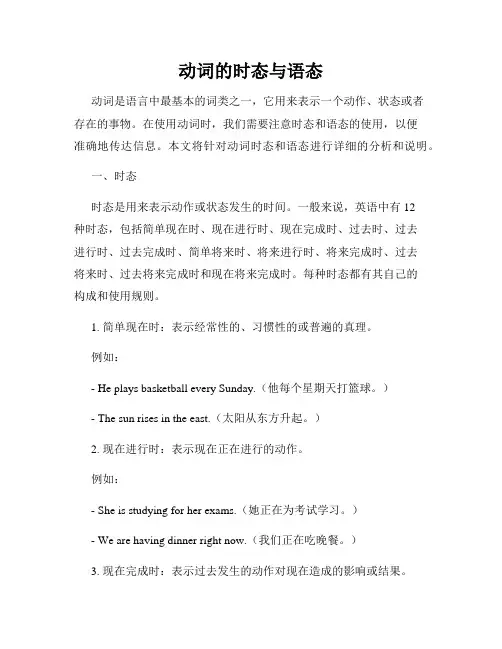
动词的时态与语态动词是语言中最基本的词类之一,它用来表示一个动作、状态或者存在的事物。
在使用动词时,我们需要注意时态和语态的使用,以便准确地传达信息。
本文将针对动词时态和语态进行详细的分析和说明。
一、时态时态是用来表示动作或状态发生的时间。
一般来说,英语中有12种时态,包括简单现在时、现在进行时、现在完成时、过去时、过去进行时、过去完成时、简单将来时、将来进行时、将来完成时、过去将来时、过去将来完成时和现在将来完成时。
每种时态都有其自己的构成和使用规则。
1. 简单现在时:表示经常性的、习惯性的或普遍的真理。
例如:- He plays basketball every Sunday.(他每个星期天打篮球。
)- The sun rises in the east.(太阳从东方升起。
)2. 现在进行时:表示现在正在进行的动作。
例如:- She is studying for her exams.(她正在为考试学习。
)- We are having dinner right now.(我们正在吃晚餐。
)3. 现在完成时:表示过去发生的动作对现在造成的影响或结果。
例如:- They have finished their homework.(他们已经完成了作业。
)- I have never been to Paris.(我从未去过巴黎。
)4. 过去时:表示过去某个时间发生的动作或存在的状态。
例如:- She visited her grandparents last weekend.(她上周末去看望了她的祖父母。
)- They lived in London for five years.(他们在伦敦住了五年。
)5. 过去进行时:表示过去某个时间正在进行的动作。
例如:- He was playing football when it started to rain.(当开始下雨时,他正在踢足球。
)- They were studying together at the library yesterday.(昨天他们在图书馆一起学习。

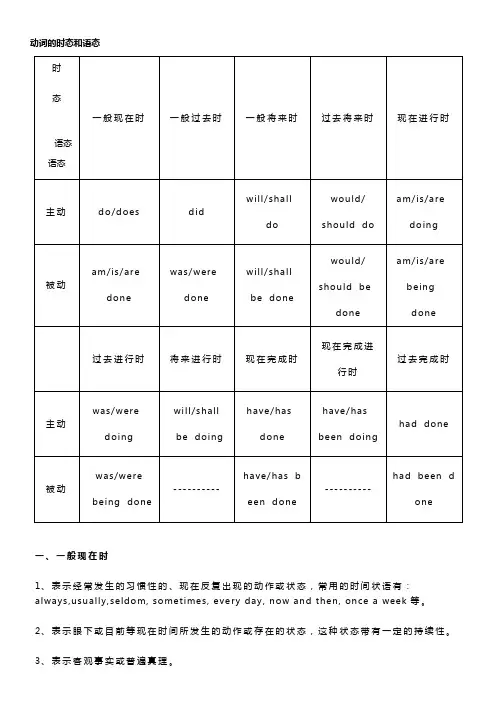
动词的时态和语态一、一般现在时1、表示经常发生的习惯性的、现在反复出现的动作或状态,常用的时间状语有:always,usually,seldom, sometimes, eve ry day, now and then, once a week等。
2、表示眼下或目前等现在时间所发生的动作或存在的状态,这种状态带有一定的持续性。
3、表示客观事实或普遍真理。
4、书报的标题,故事的叙述,小说、戏剧、电影等情节介绍,图片的说明等。
5、时间表、时刻表、日程表、节目单、课程表等按规定将要发生的动作,只限于go, arrive, leave, start, stay, return, begin, come等动词。
6、在时间、条件、方式、让步状语从句中,表示将来的动作。
注意:一般现在时可以用于定语从句或宾语从句中表示将来。
7、用在某些表达中,表示现在正在发生的动作或存在的状态。
Here comes the bus!How it rains!二、一般过去时1、表示在过去某一时间点发生的动作或所处的状态,与现在没有关系。
常用的时间状语有:yesterday, last night, at that time等。
2、表示在过去某一段时间里反复出现的动作或状态,与现在没有关系。
3、用used to do或would do表示过去经常或反复发生的动作。
4、有些情况发生的时间没清楚表明,但实际上是“刚才,刚刚”发生的,属于过去时间,应使用过去时态。
常见的有I didn’t know…或I forgot…等。
5、一般过去时可与today, this week, this month等时间状语连用。
三、一般将来时1、will/shall do(1)表示将来会出现的动作或状态。
常用的时间状语:this evening, tomorrow, next week/month…,at the end of this term, in a few minute s等。
第 12 章动词时态和语态【基础知识·归纳】一、动词的时态动词主要表示动作,其次表示状态。
动 作和状态的发生有一定的时间和表现方式, 一 般 现在 过去 将来 一般现在时 do 一般过去时 did 一般将来时 will do 过去将来时 would do 进 行 现在进行时 is doing 过去进行时 was doing 将来进行时 will be doing 过去将来进行时 would be doing 这就是英语中动词的时态。
英语动词的时态 主要由动词的不同形式来表示。
英语动词的 时态有十六种,现在以 do 为例展示如下: 完 成 现在完成时 have done 过去完成时 had done 将来完成时 will have done 过去将来完成时 would have done 完成进行 现在完成进行时 have been doing 过去完成进行时 had been doing 将来完成进行时 will have been doing 过去将来完成进行时 would have been doing过去将来在这 16 种时态中,其中有 8 种时态是 最重要的,也是用得最多的,它们是一般现 在时、一般过去时、一般将来时、过去将来 时、 现在进行时、 过去进行时、 现在完成时、 过去完成时、 ,其余的时态相对用得较少。
本章重点介绍 8 种基本时态的用法, 同时也 简单介绍另外 8 种时态的用法。
1. 一般现在时 一般现在时除主语是第三人称单数时 谓语动词要加 s 或 es 外,一律用动词原形。
其疑问句和否定句要借助助动词 do 或 does 来实现(be 和 have 除外) 。
(1) 一般现在时表现在 ① 表示现在经常性或习惯性的动作, 常与表 示频度的时间状语 every day, usually, always, often, sometimes, on Sunday 等连用。
动词的时态和语态动词的时态和语态时态是一种动词形式,它“时”和“体”的组合。
“时”有现在,过去,将来,过去将来之分,“体”有一般,进行,完成,完成进行之分,每一种“时+体”就构成一种时态,所以英语动词共有十六种时态。
体/时态/时现在过去将来过去将来一般一般现在时一般过去时一般将来时一般过去将来时进行现在进行时过去进行时将来进行时过去将来进行时完成现在完成时过去完成时将来完成时过去将来完成时完成进行现在完成进行时过去完成进行时将来完成进行时过去将来完成进行时时态和语态的运用一,一般现在时1)表示经常发生或习惯性的动作或状态。
Father always reads newspapers after supper2).表示客观事实或普遍真理。
Water boils at 100.c.3),表示按规定,计划或时间表将要发生的事。
通常限于表示运动的短暂动词,如go, come, leave, start, arrive, begin, take off等,其后常跟有表示将来的时间状语。
在这种情况下,一般现在时表示的是一般将来时意义。
The summer holidays begin next week.4),在由连词if, unless, when, as soon as, before, until, even if等引导的表示未来行为的时间,条件, 让步状语从句中,常用一般现在时代替一般将来时,但应注意,主句的谓语动词必须用一般将来时。
I will go to the park if it is fine tomorrow. I will tell him as soon as he comes back.1,I______ him very well, but I haven’t seen him this week.A, have known B, had known C, know D, knew2, The researchers said that an infant ________ born with thecapacity to speak.A, be B, would be C, is D,was3.By the time he returns , the project probably-------- ahead of time.A, will be finished B, are finishing C, will have finished D, have finished4, The plane ---------at 7:00 p.m, so I have to be at the airport by 6:40 at the latest.A, has left B, is to leave C, will have left D, leaves5,No one in the department but Tom and I ---------that the director is going to resign.A, know B, am to know C, knows D, have known6,Please bring me some books next time you---------.A, will come B, come C, are coming D, are going to come7, I______ all the cooking for my family, but recently I’ve been too busy to do it.A, will do B, do C, am doing D, had done8, Nobody has any idea that how long it will be before the hostages _______.A, are freed B, will be freed C, are to be freed D, have been freed9.Look at the pride on T om’s face. He _____ to have been praised by the manager just now.A. seemedB. seemsC. had seemedD. is seeming10.According to the literary review, Shakespeare ________ his character live through theirlanguage in his plays.A.will makeB.had madeC.was makingD.makes二,一般过去时1)表示过去某个特定时间发生的动作或存在的状态。
(详细版)初中英语动词时态和语态讲解初中英语动词时态和语态讲解 (详细版)时态(Tenses)时态是指动词在表达时间上所处的状态。
英语中共有12种时态,分别是:一般现在时、一般过去时、一般将来时、现在进行时、过去进行时、将来进行时、现在完成时、过去完成时、将来完成时、过去将来时、过去将来完成时、未来进行完成时。
一般现在时(Simple Present Tense)一般现在时用于表达经常性的动作、惯、客观真理、科学事实等。
例句:- I go to school every day. (我每天去上学。
)- Dogs are loyal animals. (狗是忠诚的动物。
)一般过去时(Simple Past Tense)一般过去时用于表达过去发生的事情或状态。
例句:- We visited Paris last summer. (去年夏天我们参观了巴黎。
)- She lived in Japan for two years. (她在日本住了两年。
)一般将来时(Simple Future Tense)一般将来时用于表达将来将要发生的事情或状态。
例句:- I will call you tomorrow. (我明天会打电话给你。
)- They are going to travel to Europe next month. (他们下个月要去欧洲旅行。
)现在进行时(Present Continuous Tense)现在进行时用于表达正在进行的动作。
例句:- She is studying for her exams. (她正在为考试而研究。
)- They are playing soccer in the park. (他们正在公园里踢足球。
)过去进行时(Past Continuous Tense)过去进行时用于表达过去某个时间正在进行的动作。
例句:- We were watching a movie when the power went out. (停电时我们正在看电影。
高中英语知识点归纳动词的时态和语态动词是英语中最重要的词类之一,学好动词的时态和语态对于高中英语学习至关重要。
时态和语态在语法和意义上都有着重要的作用,它们可以帮助我们准确表达动作的发生时间以及动作的主体和客体关系。
本文将对动词的时态和语态进行归纳总结,帮助高中学生更好地掌握这一知识点。
一、动词的时态1. 一般现在时:表示经常性或普遍性的动作或状态。
结构为"主语 + 动词原形(第三人称单数形式加-s)"。
例句:She dances every Friday evening.2. 现在进行时:表示现阶段正在进行的动作。
结构为"主语 + be动词(am/is/are)+ 现在分词"。
例句:They are playing basketball now.3. 一般过去时:表示过去某个时间发生的动作或状态。
结构为"主语 + 动词过去式"。
例句:He studied English last night.4. 过去进行时:表示过去某一时刻的持续性动作。
结构为"主语 + was/were + 现在分词"。
例句:I was reading a book when she called me.5. 现在完成时:表示从过去某一时刻开始一直延续到现在的动作或状态。
结构为"主语 + have/has + 过去分词"。
例句:She has travelled to many countries.6. 过去完成时:表示过去某一时刻之前完成的动作。
结构为"主语 + had + 过去分词"。
例句:They had already left when I arrived.7. 将来时:表示将来某个时间会发生的动作或状态。
结构为"主语 + will/shall + 动词原形"。
例句:I will call you tomorrow.8. 过去将来时:表示过去某个时间之后会发生的动作或状态。
动词的时态在英语中,由于谓语动作发生的时间不同,或表达不同时间存在的状态,谓语动词都要发生相应的变化.这些动词的形式就叫做动词的时态。
时态的用法:一般现在时:1)现在惯性的动作或存在的状态。
2)客观事实, 真理或格言。
3)表示现在将来时。
(只用于时状或条状从句中)一般过去时:1)过去习惯性的的动作或存在的状态。
2)用于“were- 型”和“if- 型”虚拟语气中。
3)表示过去将来时。
(只用于时状或条状从句中)现在进行时:1)在现在某一时刻或某段时间里正在进行的动作。
2)按计划安排在现在的将来发生的动作。
过去进行时:1)在过去的某一时刻或某段时间里正在进行的动作。
2)按计划安排在过去的将来发生的动作。
现在完成时:1)动作发生在过去,对目前有影响(注:瞬间性动词的已完成用法)2)动作发生在过去,一直延续到现在,对目前有影响。
(注:延续性动词的已完成或未完成用法)过去完成时:过去有两个动作,其中,一个动作发生时,另一个动作已经完成。
(注:过去的过去,用过去完成时)现在完成进行时:动作发生在过去,一直延续到现在,并很可能继续延续下去。
过去完成进行时:过去有两个动作。
其中,一个动作发生时,另一个动作已经完成,但该动作很可能继续延续下去。
现在将来时:在现在的将来发生的动作。
(注:含现在将来的意愿、预见或意图)过去将来时:在过去的将来发生的动作。
(注:含过去将来的意愿、预见或意图)现在将来进行时:在现在的将来某一时刻或某段时间里正在进行的动作。
(含两种用法)过去将来进行时:在过去的将来某一时刻或某段时间里正在进行的动作。
(含两种用法)现在将来完成时:在现在的将来某一时刻之前完成的动作。
过去将来完成时:在过去的将来某一时刻之前完成的动作。
现在将来完成进行时:在现在的将来某一时刻之前完成的动作,但该动作很可能继续延续下去。
过去将来完成进行时:在过去的将来某一时刻之前完成的动作,但该动作很可能继续延续下去。
被动语态的构成:被动语态由助动词be加过去分词构成,时态通过be表现出来.构成被动语态的一般疑问句时,须将第一个助动词移至主语之前,特别说明:1、主动语态和被动语态的用法完全相同。